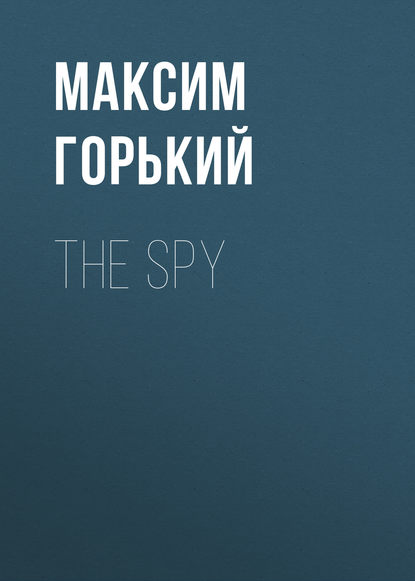По всем вопросам обращайтесь на: info@litportal.ru
(©) 2003-2024.
✖
The Spy
Настройки чтения
Размер шрифта
Высота строк
Поля
"Look, flies in my inkstand! How can I write with flies in my ink?"
The grey soldier covered with crosses and medals entered into his usual nonchalant, many-worded explanation.
"There are all in all thirty-four inkstands here, and there are thousands of flies. All the flies want to drink. That's why they crawl into the inkstands. What are they to do?"
"Wash it, and put in fresh ink," ordered Klimkov. Then he walked into the dressing-room, where he stationed himself before the looking-glass and carefully regarded his thin face, grey and angular, with its sharp little nose and narrow lips. He searched for signs of a mustache, looked into his watery and uncertain eyes.
"I must get my hair cut," he decided after failing to smooth the thin, light tufts of hair on his head. "And I ought to wear starched collars; my neck is too thin."
The very same evening he got his hair cut, bought two collars, and felt himself still more a man.
The Smokestack was attentive and kind in his behavior toward Yevsey, but often a smile of derision gleamed in his eyes which somewhat disconcerted and awed the young fellow. Whenever the hunchback came, the old man's face assumed a preoccupied expression, and his voice sounded stern. He cut short almost everything the other man said with an objection:
"It's not that – it's not so – no, you're no wiser than I am – your brain is like a poor gun, it scatters the thought on all sides. You ought to shoot so that the whole charge goes in the same direction."
The hunchback shook his head sadly, and answered in a thick voice:
"Wait. Good work cannot be done in a day. You must keep at it."
"Time flies, the enemy grows."
"By the way, I noticed a man the other day," said the hunchback, "who took lodgings not far from my place. He was tall, had a pointed beard and screwed-up eyes, and walked quickly. I asked the dvornik where he was working. He told me the man had come to look for a position. I immediately wrote a letter to the Department of Safety. You see?"
The Smokestack interrupted his talk with a wide sweep of his arm.
"That's not important. The house is damp, that's why there are roaches in it. You won't get rid of them that way. The house must be made dry."
Another time in the course of the evening the Smokestack said:
"I am a soldier. I commanded half a company, and I understand life. It is necessary for everybody to be thoroughly familiar with the laws and regulations. Such knowledge produces unanimity. What hinders knowledge of the law? Poverty and stupidity; stupidity in itself being a result of poverty. Why doesn't he fight poverty? In want is the root of human folly and of hostility to him, the Czar."
Yevsey greedily swallowed the old man's words, and believed them. The root of all human misfortune is poverty. That was clear and simple. Hence come envy, malice, cruelty. Hence also greed and the fear of life common to all people, the apprehension of one another. The Smokestack's plan was also simple. The Czar was rich, the people poor; then let the Czar give the people his riches, and all would be contented and good.
Yevsey's attitude toward people changed. He remained as obliging as before, but became more self-assertive, and began to look upon others condescendingly, with the eyes of a man who understands the secret of life and can point out where the road lies to peace and calm.
He felt the need for boasting of his knowledge; so once, when lunching in the café with Yakov Zarubin, he proudly expounded everything he had heard from the old man and his hunchback friend.
Zarubin's narrow eyes flashed. He fidgetted in his seat, and for some reason rumpled his hair by thrusting the fingers of both hands through it.
"That's true, by golly!" he exclaimed in an undertone. "What the devil – really! He has thousands of millions, and we are perishing here. Who taught you all that?"
"Nobody," said Yevsey firmly. "I thought it out myself."
"No, tell me the truth. Where did you hear it?"
"I tell you, I came to the conclusion myself."
Yakov looked at him with satisfaction.
"If that's so," he said, "you haven't a bad head. But you're lying."
Yevsey felt affronted.
"It's all the same to me whether you believe me or not. It's the worse for you if you don't."
"For me?" asked Yakov, and for some reason burst out laughing, merrily and vigorously rubbing his hands.
Two days later the assistant captain Komov and a grey-eyed gentleman with a round close-cropped head and a bored yellow face, came up to Yevsey's table.
"Klimkov, betake yourself to the Department of Safety," said the captain clearly and ominously. "Is your desk locked?"
"No."
Yevsey rose, but his legs trembled, and he dropped into his chair again. The crop-haired man drew nearer.
"Permit me," he said drily, then pulled out the table drawer and took out the papers.
Weak and uncomprehending Klimkov recovered his senses in a half dark room at a desk covered with green felt. A wave of anguish rose and fell in his breast. The floor heaved and billowed under his feet, and the walls of the room, filled, as it were with green dusk, turned around steadily. Over the table rose a man's white face framed in a thick black beard and spotted by gleaming blue eye-glasses. Yevsey kept his eyes fastened on the glass of the spectacles, on the blue bottomless darkness, which drew him like a magnet and seemed to suck the blood from his veins. Without waiting for a question Klimkov quietly told about the Smokestack and his hunchback friend. He had understood their talks well, and now spoke connectedly in great detail. He seemed to be removing a thin layer of skin from his heart.
A high voice, which cut the ear, interrupted him.
"So? So these jackasses say the emperor the Czar is the fault of everything?"
"Yes."
The man with the blue glasses slowly stretched out his hand, put the telephone receiver to his ear, and asked in a sportive tone:
"Belkin, that you? Yes? See to it, old fellow, that search is made to-night in the rooms of two scoundrels. Arrest them. Eh – eh – a clerk in the chancery department, Kapiton Reüsov. Eh – eh – and a functionary of the court of exchequer – Anton Driagin – what? Well, yes, of course."
Yevsey seized the edge of the table with his hand, feeling a dull pain in his eyes.
"So, my friend," said the man with the black beard, throwing himself back on the armchair. He smoothed his beard with both hands, played with his pencil, flung it on the table, and thrust his hands into his trousers' pockets. He was silent for a painfully long time, then he asked sternly, emphasizing each word:
"What am I to do with you now?"
"Forgive me," came from Yevsey in a whisper.
"Klimkov?" mused the black-bearded man, ignoring Yevsey's reply. "Seems to me I heard the name somewhere."
"Forgive me," repeated Yevsey.
"Do you feel yourself very guilty?"
"Very."
"That's good. What do you feel guilty of?"
Klimkov was silent. He felt as if the black-bearded man sitting so comfortably and calmly in his chair would never let him leave the room.
The grey soldier covered with crosses and medals entered into his usual nonchalant, many-worded explanation.
"There are all in all thirty-four inkstands here, and there are thousands of flies. All the flies want to drink. That's why they crawl into the inkstands. What are they to do?"
"Wash it, and put in fresh ink," ordered Klimkov. Then he walked into the dressing-room, where he stationed himself before the looking-glass and carefully regarded his thin face, grey and angular, with its sharp little nose and narrow lips. He searched for signs of a mustache, looked into his watery and uncertain eyes.
"I must get my hair cut," he decided after failing to smooth the thin, light tufts of hair on his head. "And I ought to wear starched collars; my neck is too thin."
The very same evening he got his hair cut, bought two collars, and felt himself still more a man.
The Smokestack was attentive and kind in his behavior toward Yevsey, but often a smile of derision gleamed in his eyes which somewhat disconcerted and awed the young fellow. Whenever the hunchback came, the old man's face assumed a preoccupied expression, and his voice sounded stern. He cut short almost everything the other man said with an objection:
"It's not that – it's not so – no, you're no wiser than I am – your brain is like a poor gun, it scatters the thought on all sides. You ought to shoot so that the whole charge goes in the same direction."
The hunchback shook his head sadly, and answered in a thick voice:
"Wait. Good work cannot be done in a day. You must keep at it."
"Time flies, the enemy grows."
"By the way, I noticed a man the other day," said the hunchback, "who took lodgings not far from my place. He was tall, had a pointed beard and screwed-up eyes, and walked quickly. I asked the dvornik where he was working. He told me the man had come to look for a position. I immediately wrote a letter to the Department of Safety. You see?"
The Smokestack interrupted his talk with a wide sweep of his arm.
"That's not important. The house is damp, that's why there are roaches in it. You won't get rid of them that way. The house must be made dry."
Another time in the course of the evening the Smokestack said:
"I am a soldier. I commanded half a company, and I understand life. It is necessary for everybody to be thoroughly familiar with the laws and regulations. Such knowledge produces unanimity. What hinders knowledge of the law? Poverty and stupidity; stupidity in itself being a result of poverty. Why doesn't he fight poverty? In want is the root of human folly and of hostility to him, the Czar."
Yevsey greedily swallowed the old man's words, and believed them. The root of all human misfortune is poverty. That was clear and simple. Hence come envy, malice, cruelty. Hence also greed and the fear of life common to all people, the apprehension of one another. The Smokestack's plan was also simple. The Czar was rich, the people poor; then let the Czar give the people his riches, and all would be contented and good.
Yevsey's attitude toward people changed. He remained as obliging as before, but became more self-assertive, and began to look upon others condescendingly, with the eyes of a man who understands the secret of life and can point out where the road lies to peace and calm.
He felt the need for boasting of his knowledge; so once, when lunching in the café with Yakov Zarubin, he proudly expounded everything he had heard from the old man and his hunchback friend.
Zarubin's narrow eyes flashed. He fidgetted in his seat, and for some reason rumpled his hair by thrusting the fingers of both hands through it.
"That's true, by golly!" he exclaimed in an undertone. "What the devil – really! He has thousands of millions, and we are perishing here. Who taught you all that?"
"Nobody," said Yevsey firmly. "I thought it out myself."
"No, tell me the truth. Where did you hear it?"
"I tell you, I came to the conclusion myself."
Yakov looked at him with satisfaction.
"If that's so," he said, "you haven't a bad head. But you're lying."
Yevsey felt affronted.
"It's all the same to me whether you believe me or not. It's the worse for you if you don't."
"For me?" asked Yakov, and for some reason burst out laughing, merrily and vigorously rubbing his hands.
Two days later the assistant captain Komov and a grey-eyed gentleman with a round close-cropped head and a bored yellow face, came up to Yevsey's table.
"Klimkov, betake yourself to the Department of Safety," said the captain clearly and ominously. "Is your desk locked?"
"No."
Yevsey rose, but his legs trembled, and he dropped into his chair again. The crop-haired man drew nearer.
"Permit me," he said drily, then pulled out the table drawer and took out the papers.
Weak and uncomprehending Klimkov recovered his senses in a half dark room at a desk covered with green felt. A wave of anguish rose and fell in his breast. The floor heaved and billowed under his feet, and the walls of the room, filled, as it were with green dusk, turned around steadily. Over the table rose a man's white face framed in a thick black beard and spotted by gleaming blue eye-glasses. Yevsey kept his eyes fastened on the glass of the spectacles, on the blue bottomless darkness, which drew him like a magnet and seemed to suck the blood from his veins. Without waiting for a question Klimkov quietly told about the Smokestack and his hunchback friend. He had understood their talks well, and now spoke connectedly in great detail. He seemed to be removing a thin layer of skin from his heart.
A high voice, which cut the ear, interrupted him.
"So? So these jackasses say the emperor the Czar is the fault of everything?"
"Yes."
The man with the blue glasses slowly stretched out his hand, put the telephone receiver to his ear, and asked in a sportive tone:
"Belkin, that you? Yes? See to it, old fellow, that search is made to-night in the rooms of two scoundrels. Arrest them. Eh – eh – a clerk in the chancery department, Kapiton Reüsov. Eh – eh – and a functionary of the court of exchequer – Anton Driagin – what? Well, yes, of course."
Yevsey seized the edge of the table with his hand, feeling a dull pain in his eyes.
"So, my friend," said the man with the black beard, throwing himself back on the armchair. He smoothed his beard with both hands, played with his pencil, flung it on the table, and thrust his hands into his trousers' pockets. He was silent for a painfully long time, then he asked sternly, emphasizing each word:
"What am I to do with you now?"
"Forgive me," came from Yevsey in a whisper.
"Klimkov?" mused the black-bearded man, ignoring Yevsey's reply. "Seems to me I heard the name somewhere."
"Forgive me," repeated Yevsey.
"Do you feel yourself very guilty?"
"Very."
"That's good. What do you feel guilty of?"
Klimkov was silent. He felt as if the black-bearded man sitting so comfortably and calmly in his chair would never let him leave the room.

















